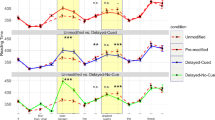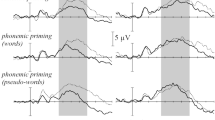Abstract
To investigate the stability of trace reactivation in healthy older adults, 22 older volunteers with no significant neurological history participated in a cross-modal priming task. Whilst both object relative center embedded (ORC) and object relative right branching (ORR) sentences were employed, working memory load was reduced by limiting the number of words separating the antecedent from the gap for both sentence types. Analysis of the results did not reveal any significant trace reactivation for the ORC or ORR sentences. The results did reveal, however, a positive correlation between age and semantic priming at the pre-gap position and a negative correlation between age and semantic priming at the gap position for ORC sentences. In contrast, there was no correlation between age and priming effects for the ORR sentences. These results indicated that trace reactivation may be sensitive to a variety of age related factors, including lexical activation and working memory. The implications of these results for sentence processing in the older population are discussed.
Similar content being viewed by others
References
Baddeley A.D. (1995). Working memory. In: Gazzaniga M.S. (ed). The Cognitive Neurosciences. pp. 755–764 MIT Press.
Cameli L., Phillips N.A. (2000). Age related differences in semantic priming: Evidence from event-related brain potentials. Brain and Cognition. 43, 69–73
Carpenter P.A., Miyake A., Just M.A. (1994). Working memory constraints in comprehension. In: Gernsbacher M.A. (ed). Handbook of Psycholinguistics. Academic Press, San Diego, CA, pp. 1075–1122
Carr T., Dagenbach T. (1990). Semantic priming and repetition priming from masked words: Evidence for a center-surround attentional processes in perceptual recognition. Journal of Experimental Psychology: Learning, Memory, and Cognition, 16, 341–350
Cedrus. (1996). Superlab Experimental Laboratory Software. Cedrus Corporation, Phoenix, AZ
Chomsky N. (1981). Lectures on Government and Binding. Foris, Dordrecht
Dagenbach D., Carr T.H., Barnhardt T.M. (1990). Inhibitory semantic priming of lexical decisions due to failure to retrieve weakly activated codes. Journal of Experimental Psychology: Learning, Memory, and Cognition. 16, 328–340
Emery O.B. (1985). Language and aging. Experimental Aging Research. 11, 3–60
Fiebach C.J., Schlesewsky M., Friederici A. (2001). Syntactic working memory and the establishment of filler-gap dependencies: Insights from ERPs and fMRI. Journal of Psycholinguistic Research. 30, 321–338
Fiebach C.J., Schlesewsky M., Friederici A. (2002). Separating syntactic memory costs and syntactic integration costs during parsing: the processing of German WH-questions. Journal of Memory and Language. 47, 250–272
Giffard N., Desgranges B., Kerrouche N., Piolino P., Eustache F. (2003). The hyperpriming phenomenon in normal aging: A consequence of cognitive slowing?. Neuropsychology. 17(4): 594–601
Grossman M., Cooke A., Devita C., Chen W., Moore P., et al. (2002). Sentence processing strategies in healthy seniors with poor comprehension: An fMRI study. Brain and Language. 80, 296–313
Haarmann H.J., Cameron K.A., Ruchkin D.S. (2003). Short-term semantic retention during on-line sentence comprehension: Brain potential evidence from filler-gap constructions. Cognitive Brain Research. 15, 178–190
Hakes D.T., Evans J.S., Brannon L.L. (1976). Understanding sentences with relative clauses. Memory and Cognition. 4(3): 283–290
Holmes V.M. (1973). Order of main and subordinate clauses in sentence perception. Journal of Verbal Learning and Verbal Behaviour. 12, 285–293
Linnville S.E. (1995). Are there age-related processing differences in semantic priming. Perceptual and Motor Skills. 80(2): 585–586
Love T., Swinney D. (1996). Coreference processing and levels of analysis in object-relative constructions; demonstration of antecedent reactivation with the cross- modal priming paradigm. Journal of Psycholinguistic Research. 25, 5–24
McKoon G., Ratcliff R. (1994). Sentential context and on-line lexical decision tasks. Journal of Experimental Psychology: Learning, Memory and Cognition. 20, 1219–1228
Nicol J.L., Fodor J.D., Swinney D. (1994). Using cross-modal lexical decision tasks to investigate sentence processing. Journal of Experimental Psychology: Learning Memory and Cognition. 20, 1229–1238
Obler L., Fein D., Nicholas M., Albert M.L. (1991). Auditory comprehension and aging: Decline in syntactic processing. Applied Psycholinguistics. 12, 433–452
Prather P., Zurif E., Stern C., Rosen T. (1992). Slowed lexical access in nonfluent aphasia: A case study. Brain and Language. 43, 336–348
Stine E.A.L., Wingfield A. (1990). How much do working memory deficits contribute to age differences in discourse memory?. European Journal of Cognitive Psychology. 2, 289–304
Stine-Morrow E.A., Ryan S., Leonard J.S. (2000). Age differences in on-line syntactic processing. Experimental Aging Research. 26, 315–322
Swinney D., Zurif E. (1995). Syntactic processing in aphasia. Brain and Language. 50, 225–239
Swinney D., Onifer W., Prather P., Hirshkowitz M. (1979). Semantic facilitation across sensory modalities in the processing of individual words and sentences. Memory and Cognition. 7, 159–165
Wingfield A., Lindfield K.C. (1995). Multiple memory systems in the processing of speech: Evidence from aging. Experimental Aging Research. 21, 101–121
Zurif E.B., Swinney D., Prather P., Wingfield A., Brownell H.H. (1995). The allocation of memory resources during sentences comprehension: Evidence from the elderly. Journal of Psycholinguistic Research. 24, 165–182
Author information
Authors and Affiliations
Corresponding author
Rights and permissions
About this article
Cite this article
Angwin, A.J., Chenery, H.J., Copland, D.A. et al. Searching for the Trace: The Influence of Age, Lexical Activation and Working Memory on Sentence Processing. J Psycholinguist Res 35, 101–117 (2006). https://doi.org/10.1007/s10936-005-9006-3
Published:
Issue Date:
DOI: https://doi.org/10.1007/s10936-005-9006-3




